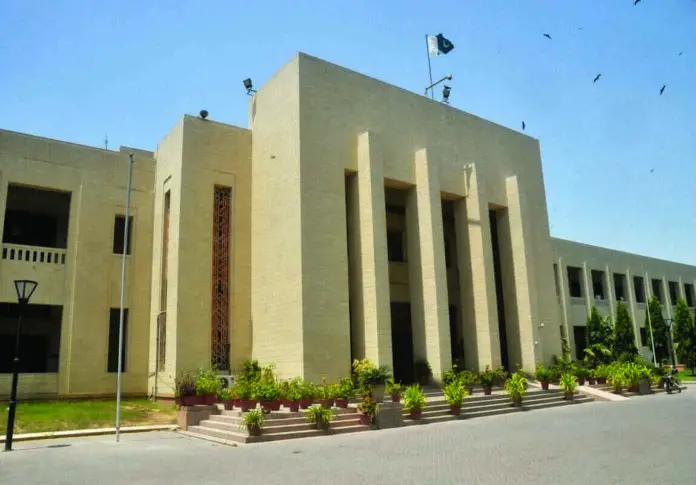Sindh Chief Minister Murad Ali Shah on Tuesday presented the provincial ‘pro-poor ‘ deficit budget with a total outlay of Rs1.713 trillion for fiscal year 2022-23.
According to the chief minister, the total receipts of the provincial government for the next financial year would amount to Rs1,679,734.8 million against the expenditures of Rs1,713,583.1 million, hence a deficit of Rs33.848 billion.
In his budget speech, Murad told the House that the overall revenue receipts would be Rs1,679,734.8 million, including Rs1,055 million federal transfers, Rs374.5 billion provincial receipts (Rs167.5 billion provincial tax receipts excluding GST on services, Rs180 billion provincial sales tax on services and Rs27 billion provincial non-tax receipts), Rs51.1328 billion current capital receipts, Rs105.5675 billion other transfers such as foreign project assistance, federal grants and foreign grants, and Rs20 billion carry over cash balance and public accounts of the province.
He said the provincial tax collecting organisations would achieve their collection targets, such as Sindh Revenue Board’s (SRB) Rs180 billion, Excise & Taxation’s Rs1.20 billion and Board of Revenue’s Rs30 billion.
The chief minister said that the current revenue expenditures for the next financial year would be Rs1,199.4454 billion, current capital expenditures Rs54.48 billion, development portfolio Rs459.65 billion, including Rs332.165 billion provincial Annual Development Programme (ADP), Rs30 billion district ADP, and Rs91.467 billion foreign assistance project (FAP), and Rs6.02 billion other federal grants.
According to the CM, the provincial government, during the 11 months (July to May) of the outgoing financial year, had received Rs716 billion against a share of Rs732 billion, which showed a shortfall of Rs16 billion.
He said his government, during the said period, received Rs45 billion in straight transfers and in octroi and zila tax (OZT) by receiving Rs18.9 billion against a share of Rs19.7 billion.
The provincial government has allocated Rs332.165 billion for the ADP 2022-23, while it was Rs222.5 billion during the outgoing year. The district ADP size has been kept at Rs30 billion as was done during the outgoing financial year.
The CM disclosed that 4,158 schemes, including 2,506 ongoing and 1,652 new schemes, had been given an allocation of Rs332.165 billion. He said that 2,506 ongoing schemes had been given 76 per cent of funds, or Rs253.146 billion, and 1,652 new schemes were allocated 24 per cent of the funds, which amounted to Rs79.019 billion. He also announced that 1,510 schemes would be completed in FY 2022-23.
Murad announced Rs26.850 billion for a ‘pro-poor, social protection and economic sustainability package’. He also announced that ad hoc relief allowances for the years 2016, 2017, 2018, 2019 and 2021 at the rates admissible to employees of the federal government were being merged and the revised basic pay scale 2022 for civil servants of Sindh government was being introduced on the pattern of the federal government.
He announced ad hoc relief allowance at the rate of 15 per cent of basic pay scales to government servants from July 1, 2022.
“Disparity allowance at the rate of 33 per cent of basic pay will be paid to civil servants in BPS-1 to 16 and at the rate of 30 per cent to civil servants in BPS-17 and above in lieu of the differential rate of ad hoc relief allowances 2013, 2015, 2016, 2017, 2018, 2019, 2020 and 2021, which are being abolished from July 2022,” he said.
He announced that all provinces had not presented their budgets yet, and “if they decide to increase the salaries of their employees more than that of the employees of the Sindh government, we would take decisions accordingly, though the salaries and pensions of our employees are better than the employees of other provinces”. He also announced to upgrade the police constable post from grade 5 to grade 7.
“The existing exemption on health insurance services will continue for a period of one year until June 30, 2023. GIZ, a German development agency, facilitating development projects in Sindh, has also been granted conditional exemption on sales tax on services as indirect relief to the public.”
The Sindh CM said that his government had kept the education sector at the top priority by allocating Rs326.80 billion, which forms more than 25 per cent of the total budget outlay. He said the government would either establish a full-fledged university or a campus of a recognised public university in at least seven districts, one each in Korangi, Karachi West, Keamari, Malir, Tando M Khan, Tando Allah Yar, and Sujawal.
Murad said the health sector had also been given top priority. “The total outlay of the health budget for the fiscal year 2022-23 is proposed at Rs206.98 billion that covers primary, secondary, and tertiary healthcare services, preventive interventions as well as other communicable and non-communicable diseases,” he said, adding the budgetary allocation was 14 per cent higher than Rs181.22 billion of FY 2021-22.
The provincial government increased allocations for maintaining law and order to Rs124.873 billion from Rs119.98 billion for the outgoing fiscal year.
The provincial government also earmarked Rs4 billion for the procurement of buses. Murad said his government had already spent Rs6.4 billion in 2021-22 on the procurement of 250 buses by the Sindh Mass Transit Authority (SMTA), adding that the grant for SMTA had been enhanced by 50 per cent from Rs200 million to Rs300 million for FY 2022-23.







